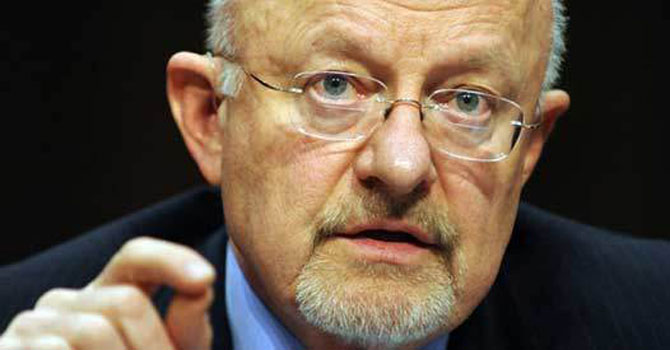WASHINGTON: US intelligence agencies have informed Congress that the coming general elections will be a milestone for Pakistan and must be held by May 2013.
In a report sent to Congress on Tuesday, James R. Clapper, Director US National Intelligence, also notes that “Islamabad is intently focused on Afghanistan” in anticipation of the withdrawal of American and Nato forces.
The annual report titled “Worldwide Threat Assessment” includes the input of 16 US intelligence agencies, including the CIA.
The report points out that since late last year, the Pakistani government has attempted to improve relations with Kabul and ensure that its views are taken into consideration during the transition period.
The military this year continued operations in Fata and has forces in place for an operation against anti-Pakistan militants in North Waziristan.
The report notes there were fewer domestic attacks by the Tehrik-i-Taliban Pakistan this year than in the previous several years.
“Economically, trouble looms. Pakistan, with its small tax base, poor system of tax collection, and reliance on foreign aid, faces no real prospects for sustainable economic growth,” the report warns.
“The government has been unwilling to address economic problems that continue to constrain economic growth. The government has made no real effort to persuade its disparate coalition members to accept much-needed policy and tax reforms, because members are focused on retaining their seats in upcoming elections.”
Sustained remittances from overseas Pakistanis (roughly $13 billion from July 2011 to June 2012) have helped to slow the loss of reserves. However, Pakistan has to repay the IMF $1.7bn for the rest of this fiscal year for money borrowed as part of its 2008 bailout agreement; growth was around 3.5 per cent in 2012; and foreign direct investment and domestic investment have both declined substantially.
Assessing India-Pakistan ties, US intelligence officials informed Congress that both countries had made calculated decisions to improve ties, despite deep-rooted mistrust. They held a series of meetings in the past year and would probably continue to achieve incremental progress on economic relations, such as trade.
Serious discussion on the more contentious issues of territorial disputes and terrorism, however, were deferred.
But the report warns that “even modest progress could easily be undone by a terrorist attack against India linked to Pakistan, which could trigger a new crisis and prompt New Delhi to freeze bilateral dialogue.”
“We judge that India sees its goals in Afghanistan as consistent with US objectives, and favours sustained Isaf and US presence in the country,” say US intelligence agencies while assessing India’s role in Afghanistan.
As the International Security Assistance Force completes its drawdown, US intelligence officials assess that “the Taliban-led insurgency has diminished in some areas of Afghanistan but remains resilient and capable of challenging US and international goals”.
Taliban senior leaders also continue to be based in Pakistan, which allows them to provide strategic guidance to the insurgency without fear for their safety, the report adds.
It sees Al Qaeda’s influence on the insurgency as limited, although its propaganda gains from participating in insurgent attacks far outweigh its actual battlefield impact.
The report notes that security gains are especially fragile in areas where Isaf surge forces have been concentrated since 2010 and are now transitioning the security lead to Afghan National Security Forces.
The report also warns that Afghanistan’s economy, which has been expanding at a steady rate, is likely to slow after 2014.
“Kabul has little hope of offsetting the coming drop in western aid and military spending, which have fuelled growth in the construction and services sectors.
“The country faces high rates of poverty, unemployment, food insecurity, and poppy cultivation.”































